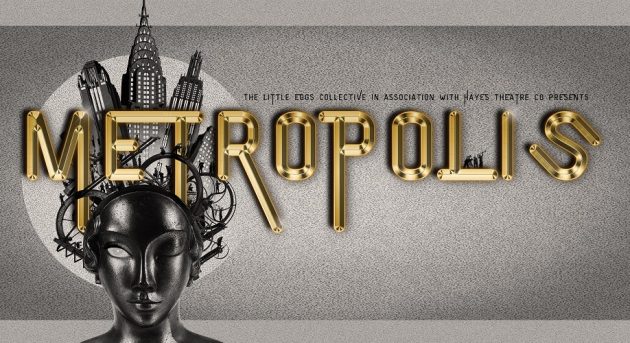Metropolis and the Mechanisation of Society
This April will usher in a new and timely production at the Hayes Theatre Company: Metropolis. Based on the 1925 Thea Von Harbou’s science-fiction novel of the same name, this dystopian extravaganza – its cast is both seasoned and sparkly – could hardly scream 2023 more loudly.
This fresh Little Eggs Collective incarnation of Metropolis tells the story of a futuristic city divided into two classes: the wealthy, who live in the majestic – and symbolic – high-rise buildings above ground and the working-class who labour tirelessly in an underworld of factories and tunnels. A contrast between gods and mortals, to look at it in a more operatic way. Metropolis follows the journey of Freder, son of the city’s ruler, who uncovers the plight of the workers. Freder falls in love with the working-class Maria, who is leading a rebellion against the elite. Through Maria, Freder has his eyes opened to the exploitation of the masses and the dehumanising dangers of industrialisation. The need for justice and empathy becomes apparent to Freder through his liaison with Maria. The message here seems to be that the powerful and privileged must ‘wake up’ and actually witness the conditions that fuel their wealth – if not, the oppressed will surely stage an uprising. And, given that this is also a love story, the suggestion is that benevolence and empathy are crucial to the healthy functioning of society.
Metropolis is, ultimately, an exposé of the ills of modern capitalism, wherein the powerful flourish by harnessing the human energy that toils away beneath the surface. Originally, the story was a commentary on the political backdrop of Weimar Germany, where the glamour and decadence of modern German cities masked the horrors of hyperinflation and the increasing number of public rebellions. This was a society that enabled the rise of Hitler, a society so disaffected that evil was invited to flourish. Von Harbou was not the only 1920s creative to warn of the dangers of ignoring the marginalised: Sergei Eisenstein’s film Strike employed images of striking workers cross-cut with seemingly unrelated images of cattle being slaughtered – a juxtaposition that clearly associated the treatment of workers with that of cattle.
The concept of a metropolis provides rich grounding for an examination of societal themes: power, corruption, greed, class division – and idealism. A metropolis has connotations of excitement and opportunities, a place where anything is possible. The flip side, of course, is that beneath the sophistication, adventure and vibrancy another world coexists: a world of anonymity, atomisation, and isolation, where human beings are synonymous with machinery. What appears to be a utopia – and is, for some – is darkly dystopian for the side-lined majority.
But what makes Metropolis so truly topical right now? After all, stratified society divided between the ruling elite and the workers is not exactly unique to the 2020s. Income inequality has long been a pressing issue, albeit a lot more pointed now than it has been for some time. And the working masses have long had unspoken associations with herds of cattle. Never before, however, have human beings become so interchangeable with machinery. Let’s face it, artificial intelligence isn’t going anywhere. As a society, we’ve been like frogs boiled in water for a long time now. We don’t question the everyday ‘conveniences’ of cash-dispensing machines or self-checkouts in the supermarket. But it’s now bigger than that. The field of artificial intelligence is undergoing rampant growth. As we become more technologically advanced, the themes of artificial intelligence and robotics will only become more pertinent. The drama’s depiction of the dangers of unchecked technological progress and the potential for machines to outstrip human control is poignantly relevant in 2023.
So how do we sort out the positive technology from the harmful? In Metropolis, Maria is cloned, making it impossible to tell the real Maria and her robotic counterpart apart. Robotic Maria is the brainchild of the villainous Rotwang, who sends ‘her’ to cause chaos and unrest. Yet, it is worth remembering that Rotwang is motivated by bitterness, a very human emotion, having long ago lost the woman he loved to Frederson (Freder’s father). Machinery cannot, thankfully, usurp what is fundamentally human. Nevertheless, this cautionary tale can help us all be alive to the injustices of the world we inhabit.




